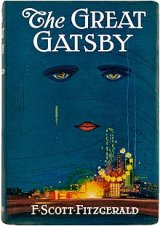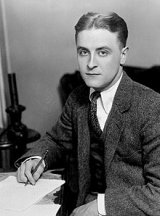The Great Gatsby Page #8
The Great Gatsby is a 1925 novel by American writer F. Scott Fitzgerald. Set in the Jazz Age on Long Island, near New York City, the novel depicts first-person narrator Nick Carraway's interactions with mysterious millionaire Jay Gatsby and Gatsby's obsession to reunite with his former lover, Daisy Buchanan. The novel was inspired by a youthful romance Fitzgerald had with socialite Ginevra King, and the riotous parties he attended on Long Island's North Shore in 1922
“I’d like to do more work on Long Island, if I could get the entry. All I ask is that they should give me a start.” “Ask Myrtle,” said Tom, breaking into a short shout of laughter as Mrs. Wilson entered with a tray. “She’ll give you a letter of introduction, won’t you, Myrtle?” “Do what?” she asked, startled. “You’ll give McKee a letter of introduction to your husband, so he can do some studies of him.” His lips moved silently for a moment as he invented, “ ‘George B. Wilson at the Gasoline Pump,’ or something like that.” Catherine leaned close to me and whispered in my ear: “Neither of them can stand the person they’re married to.” “Can’t they?” “Can’t stand them.” She looked at Myrtle and then at Tom. “What I say is, why go on living with them if they can’t stand them? If I was them I’d get a divorce and get married to each other right away.” “Doesn’t she like Wilson either?” The answer to this was unexpected. It came from Myrtle, who had overheard the question, and it was violent and obscene. “You see,” cried Catherine triumphantly. She lowered her voice again. “It’s really his wife that’s keeping them apart. She’s a Catholic, and they don’t believe in divorce.” Daisy was not a Catholic, and I was a little shocked at the elaborateness of the lie. “When they do get married,” continued Catherine, “they’re going West to live for a while until it blows over.” “It’d be more discreet to go to Europe.” “Oh, do you like Europe?” she exclaimed surprisingly. “I just got back from Monte Carlo.” “Really.” “Just last year. I went over there with another girl.” “Stay long?” “No, we just went to Monte Carlo and back. We went by way of Marseilles. We had over twelve hundred dollars when we started, but we got gyped out of it all in two days in the private rooms. We had an awful time getting back, I can tell you. God, how I hated that town!” The late afternoon sky bloomed in the window for a moment like the blue honey of the Mediterranean—then the shrill voice of Mrs. McKee called me back into the room. “I almost made a mistake, too,” she declared vigorously. “I almost married a little kike who’d been after me for years. I knew he was below me. Everybody kept saying to me: ‘Lucille, that man’s way below you!’ But if I hadn’t met Chester, he’d of got me sure.” “Yes, but listen,” said Myrtle Wilson, nodding her head up and down, “at least you didn’t marry him.” “I know I didn’t.” “Well, I married him,” said Myrtle, ambiguously. “And that’s the difference between your case and mine.” “Why did you, Myrtle?” demanded Catherine. “Nobody forced you to.” Myrtle considered. “I married him because I thought he was a gentleman,” she said finally. “I thought he knew something about breeding, but he wasn’t fit to lick my shoe.” “You were crazy about him for a while,” said Catherine. “Crazy about him!” cried Myrtle incredulously. “Who said I was crazy about him? I never was any more crazy about him than I was about that man there.” She pointed suddenly at me, and everyone looked at me accusingly. I tried to show by my expression that I expected no affection. “The only crazy I was was when I married him. I knew right away I made a mistake. He borrowed somebody’s best suit to get married in, and never even told me about it, and the man came after it one day when he was out: ‘Oh, is that your suit?’ I said. ‘This is the first I ever heard about it.’ But I gave it to him and then I lay down and cried to beat the band all afternoon.” “She really ought to get away from him,” resumed Catherine to me. “They’ve been living over that garage for eleven years. And Tom’s the first sweetie she ever had.” The bottle of whisky—a second one—was now in constant demand by all present, excepting Catherine, who “felt just as good on nothing at all.” Tom rang for the janitor and sent him for some celebrated sandwiches, which were a complete supper in themselves. I wanted to get out and walk eastward toward the park through the soft twilight, but each time I tried to go I became entangled in some wild, strident argument which pulled me back, as if with ropes, into my chair. Yet high over the city our line of yellow windows must have contributed their share of human secrecy to the casual watcher in the darkening streets, and I saw him too, looking up and wondering. I was within and without, simultaneously enchanted and repelled by the inexhaustible variety of life. Myrtle pulled her chair close to mine, and suddenly her warm breath poured over me the story of her first meeting with Tom. “It was on the two little seats facing each other that are always the last ones left on the train. I was going up to New York to see my sister and spend the night. He had on a dress suit and patent leather shoes, and I couldn’t keep my eyes off him, but every time he looked at me I had to pretend to be looking at the advertisement over his head. When we came into the station he was next to me, and his white shirtfront pressed against my arm, and so I told him I’d have to call a policeman, but he knew I lied. I was so excited that when I got into a taxi with him I didn’t hardly know I wasn’t getting into a subway train. All I kept thinking about, over and over, was ‘You can’t live forever; you can’t live forever.’ ” She turned to Mrs. McKee and the room rang full of her artificial laughter. “My dear,” she cried, “I’m going to give you this dress as soon as I’m through with it. I’ve got to get another one tomorrow. I’m going to make a list of all the things I’ve got to get. A massage and a wave, and a collar for the dog, and one of those cute little ashtrays where you touch a spring, and a wreath with a black silk bow for mother’s grave that’ll last all summer. I got to write down a list so I won’t forget all the things I got to do.” It was nine o’clock—almost immediately afterward I looked at my watch and found it was ten. Mr. McKee was asleep on a chair with his fists clenched in his lap, like a photograph of a man of action. Taking out my handkerchief I wiped from his cheek the spot of dried lather that had worried me all the afternoon. The little dog was sitting on the table looking with blind eyes through the smoke, and from time to time groaning faintly. People disappeared, reappeared, made plans to go somewhere, and then lost each other, searched for each other, found each other a few feet away. Some time toward midnight Tom Buchanan and Mrs. Wilson stood face to face discussing, in impassioned voices, whether Mrs. Wilson had any right to mention Daisy’s name. “Daisy! Daisy! Daisy!” shouted Mrs. Wilson. “I’ll say it whenever I want to! Daisy! Dai—” Making a short deft movement, Tom Buchanan broke her nose with his open hand. Then there were bloody towels upon the bathroom floor, and women’s voices scolding, and high over the confusion a long broken wail of pain. Mr. McKee awoke from his doze and started in a daze toward the door. When he had gone halfway he turned around and stared at the
Translation
Translate and read this book in other languages:
Select another language:
- - Select -
- 简体中文 (Chinese - Simplified)
- 繁體中文 (Chinese - Traditional)
- Español (Spanish)
- Esperanto (Esperanto)
- 日本語 (Japanese)
- Português (Portuguese)
- Deutsch (German)
- العربية (Arabic)
- Français (French)
- Русский (Russian)
- ಕನ್ನಡ (Kannada)
- 한국어 (Korean)
- עברית (Hebrew)
- Gaeilge (Irish)
- Українська (Ukrainian)
- اردو (Urdu)
- Magyar (Hungarian)
- मानक हिन्दी (Hindi)
- Indonesia (Indonesian)
- Italiano (Italian)
- தமிழ் (Tamil)
- Türkçe (Turkish)
- తెలుగు (Telugu)
- ภาษาไทย (Thai)
- Tiếng Việt (Vietnamese)
- Čeština (Czech)
- Polski (Polish)
- Bahasa Indonesia (Indonesian)
- Românește (Romanian)
- Nederlands (Dutch)
- Ελληνικά (Greek)
- Latinum (Latin)
- Svenska (Swedish)
- Dansk (Danish)
- Suomi (Finnish)
- فارسی (Persian)
- ייִדיש (Yiddish)
- հայերեն (Armenian)
- Norsk (Norwegian)
- English (English)
Citation
Use the citation below to add this book to your bibliography:
Style:MLAChicagoAPA
"The Great Gatsby Books." Literature.com. STANDS4 LLC, 2025. Web. 23 Feb. 2025. <https://www.literature.com/book/the_great_gatsby_1598>.








Discuss this The Great Gatsby book with the community:
Report Comment
We're doing our best to make sure our content is useful, accurate and safe.
If by any chance you spot an inappropriate comment while navigating through our website please use this form to let us know, and we'll take care of it shortly.
Attachment
You need to be logged in to favorite.
Log In